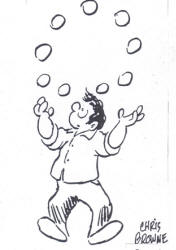
BillJoyners Rock n Rollin Log
THE SEED CATALOG 2010
SPRING 2010

| Dear Friends (actually &
potentially) of THE SEED CATALOG,
Luther, and even Father Abraham himself, whose interpretations have often been less than helpful in contributing to human well-being and self-understanding. So I hope you will consider the work of such scholars as Erich Fromm (ESCAPE FROM FREEDOM), Bruce Bawer (STEALING JESUS), and Bruce Chilton (ABRAHAM'S CURSE) in the context of today' s religious confusion.
|
Escape from Freedom
---ERICH FROMM page 81
Luther's relationship to Cod was one of complete submission. In psychological terms his concept of faith means: if you completely submit, if you accept your individual insignificance, then the all-powerful Cod may be willing to love you and save you. If you get rid of your individual self with all its shortcomings and doubts by utmost self-effacement, you free yourself from the feeling of your own nothingness and can participate in God's glory. Thus. while Luther freed people from the authority .of the Church, he made them submit to a much more tyrannical authority, that of a Cod who insisted on complete submission of man and annihilation of the individual self as the essential condition to his salvation. Luther's "faith" was' the conviction of being loved upon the condition of surrender, a solution which has much in common with the principle of complete submission of the individual to the state and the "leader."
|
||||
 |
|||||
|
A SUFFERING GOD IN THE HANDS OF
AN ANGRY MOB
Seeds of a Sermon delivered In Sarasota at First Congregational (UCC) on Sunday, June 22, 1980 WiIIiam T. Joyner \ Bachelor of Divinity
|
|||||
|
|||||
|
Leonard Cohen is a saint to me, and I love his description of what one might be:
"A saint'is someone who has achieved a remote human possibility ... "I think it has something to do with the energy of love. "It is a kind of balance that is his glory. He rides the drifts like an escaped ski. His course is a caress of the hill ... Something in him so loves the world that he gives himself to the laws of gravity and chance." - Leonard Cohen |
Yes, God be praised, love abides! Whatever the world takes away from you, though it be the most cherished, whatever happens to you in life, however you may have to suffer because of your striving, for the good, if you please, if men turn indifferent from you or as enemies against you, if no one is willing to admit acquaintance with you or acknowledge what he nevertheless owes to you, if even your best friend should deny you-if nevertheless in any of your strivings, in any of your actions, in any of your words you truly have consciously had love along: then take comfort, for love abides. - Kierkegaard
|
||||
|
Corita Kent SURVIVING WITH STYLE URBAN GUERRILLA WITH PAINT BRUSH When Corita Kent died here in Boston last month, the first. thing I thought of was a splendid evening we . , shared sometime around 1970 which we called "A Peace of Bread" The title, of course, was one of her puns. We invited lots of people - many hundreds came to a gathering for song, poetry, art, and the sharing of bread, all as a celebration of life and a protest against the war in Vietnam. It was a great evening. Micki Myers, Corita's talented young protge, had done a lot of the preparation. The lighting was c1assicallate-sixties. The mood was upbeat. People obviously wanted to say and do something positive and affirming, not just continue to say "no" to the war. It was also the time when the vague oriental wave had already crested and many young people were looking to Christianity again. Dan Berrigan was there, reading his poetry, 14 garland of carnations and daisies around his neck. Judy Collins, Corita's friend, threw back her head and sang a couple of her best songs, including - as I recall - "Clouds." I was a sort of master of ceremonies. But the high point was Corita. High because it was so low profile, so unassuming, so matter-offact. She simply showed some slides and talked about a disturbed and painfully shy little girl she had helped to lead out of her pain and withdrawal by teaching her ho~ to draw a large sunflower. She ended by saying something which, when I write it down now, sounds hopelessly trite. But when she said it that night it was anything but ordinary. I forget the exact words, but it had to do with bringing out - into visibility and color and texture and light - the flower Inside each of us. Why is it that I forget almost everything about the rest of that evening, but ( remember Corita - small, fragile, earnest, speaking almost shyly about something which, at least on the surface seemed to have little to do with the bombing of Hanoi? |
I think it is because Corita had a complex kind of simplicity. She combined a childlike innocence with the kind of wisdom one finds more often among very old women. She mixed being serene with being high-strung. Above all, she had a certain indefatigable resiliency. She was a fighter who not only survived the scarring battles the Immaculate Heart Sisters lived through but did it with verve. Of all her slogan posters I think I like "Survival with Style" the best. That's who Corita was, a survivor with style. Corita Kent also won my heart because she had an urban sensibility. She loved the City. She reveled in the junk and handouts and throwaways and labels and ads that most people experience merely as a suffocating wave of mind-deadening trivia. For her they provided the endlessly fascinating material for her lively and playful art. In this sense Corita was profoundly sacramental and very, very "Catholic." The world of signs and sales slogans and plastic containers was not, for her, an empty wasteland. It was the dough out of which she baked the bread of life. Like a priest, a shaman, a magician, she could pass her hands over the commonest of the everyday, the superficial, the oh-so-ordinary, and make it a vehicle of the luminous. the only, and the hope-filled. Every time I drive to the Cape I go by the huge oil storage tank she splashed with her famous, colossal squiggly daubs. There they are, assertively antic, endlessly making gentle fun of the bizarrely inappropriate structure they are splashed over. When I see them I always smile. No matter how horrendous the traffic is on the Southeast Expressway, no matter how bad a day it has been, my spirits are always lifted. For Corita "art" did not belong under glass. Art meant transforming even the ugliest parts of the urban environment into testimonies of joy. She was an urban guerrilla with a paint brush. I have not driven by that tank since Corita died. The next time I do I know I'll feel a stab of sadness. There are so many girders and stanchions and dreary warehouses and pipelines that still invite her magic touch. She's gone now. But I hope somewhere little girls and boys are letting the flowers within come out, and some adults are remembering that even something as banal as Wonderbread can taste great if you know how to serve it up. Corita did not survive her last battle, but she lived - and died - with style. For that I'll always be thankful.. HARVEY COX (Harvey Cox teaches at Harvard Divinity School. His most recent book is Religion in the Secular City, published by Simon & Schuster.) Commonweal: 550 1986
|
||||
|
|
|||||
|
|
|
|

P.O. Box 3411
Sarasota, FL 34230
This is the tough part, the pitch for continuing seed back support. But, as Van Morrison says in his song, "I'm real real gone," and "I can't stand up alone." Just kindly let me know by checking the form below, whether and/or how you'd like to respond to the ongoing 3 times a year publication of THE SEED CATALOG:
___ Yes, bring it on, in whatever form!
___ No more mailings, will check it out on the web at www.seedcatalog.cc (or not) -- ha, ha!
Thanks, too, for any financial or moral support. ($5 donation suggested) Bill Joyner [email protected]

1210 E. M.L. King Blvd.
Tampa, FL 33603
Email: [email protected]
The Seed Catalog
William T. Joyner, Editor
THE SEED CATALOG is a continuing quarterly newsletter promoting
understandings of secular spirituality, available annually for a $5 donation. Additional contacts are appreciated
should you wish to provide names and
addresses of any who might enjoy it on an exploratory basis.
Thanks for tuning in!
--Bill Joyner / P.O. Box 3411 / Sarasota, FL 34230
Send me your feedback - comments, suggestions and contributions welcome


